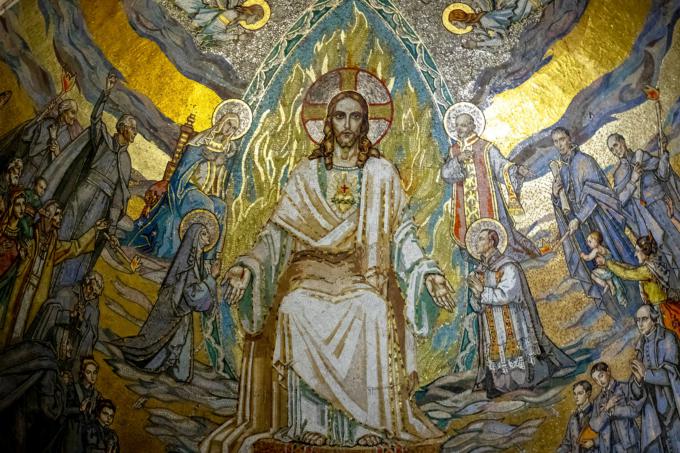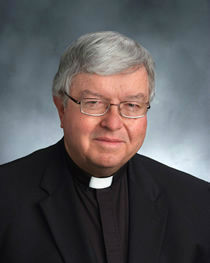
Faith
The Fathers of the Church allude to the standard practice of praying for the dead. In the middle of the third century, St. Cyprian of Carthage told us that prayers for the departed had been said in all the churches since the time of the apostles.

Doyle
Q. I was raised to be a devout Catholic and have a great interest in works of theology, such as those by Thomas Aquinas. But my mother, who is also a Catholic, doesn't believe in purgatory. She thinks that God loves us so much that there wouldn't be a reason for purgatory. Is there any way I can try to prove it to her? (Charlotte, Michigan)
A. Many Protestants do not believe in purgatory, claiming that this teaching denies the sufficiency of Christ's sacrifice for our sins. (Some point, too, to the fact that the word "purgatory" exists nowhere in the Bible, but that argument seems to me to lack force -- the words "Trinity" and "Incarnation" do not appear either.)
Actually, a belief in a postmortem purification predates Christianity. Shortly before the advent of Christ, in the Old Testament Book of Second Maccabees (12:39-46) Judas Maccabeus was collecting the bodies of fallen comrades when he noticed that some of them had been wearing pagan amulets; so he arranged for an expiatory sacrifice and "made atonement for the dead that they might be absolved from their sin." The implication, of course, is that some sins can be forgiven in the world to come.
That implication is confirmed in the Gospel of Matthew (12:32), where Jesus says, "Whoever speaks a word against the Son of Man will be forgiven; but whoever speaks against the Holy Spirit will not be forgiven, either in this age or in the age to come." The Fathers of the Church allude to the standard practice of praying for the dead. In the middle of the third century, St. Cyprian of Carthage told us that prayers for the departed had been said in all the churches since the time of the apostles.
This belief is codified in the Catechism of the Catholic Church: "All who die in God's grace and friendship, but still imperfectly purified, are indeed assured of their eternal salvation; but after death they undergo purification, so as to achieve the holiness necessary to enter the joy of heaven. The Church gives the name 'Purgatory' to this final purification of the elect" (No. 1030-1031). What we don't know, of course, is the exact nature of that purification, how many people undergo it, or whether it might even be instantaneous.
Q. In 1999, I traveled to the Holy Land, and one of our stops was at the Basilica of the Dormition. We were told that this is the site where the Virgin Mary died. Some years later, I visited Ephesus in Turkey and took a cab out to a little home where, we were told, Mary had lived and died. In 1967, St. Paul VI visited there, and in 1979 St. John Paul II celebrated Mass there. My question is this: On a matter of such historical importance, why hasn't the Church made a decision on the correct place where Mary died? (Georgia)
A. First, I should answer a question you didn't even ask: Did Mary die, as we know death? That question has prompted theological speculation for centuries, and the Church has never answered it in a definitive way.
When, in 1950, Pope Pius XII solemnly defined the dogma of the Assumption, he said "the Immaculate mother of God, the ever-Virgin Mary, having completed the course of her earthly life, was assumed body and soul into heavenly glory." That seems to leave open the question of whether Mary died first.
Some theologians feel that, since death is a consequence of sin, Mary would not have had to die. But others speculate that, since Jesus himself chose to die, wouldn't it be fitting for his mother to have shared the same fate?
Moving on to the question you did ask -- where Mary spent her final years on earth -- there are two strong historical traditions. One is that, following the ascension of Jesus, Mary returned with the apostles to Jerusalem and lived there for the remainder of her earthly years.
But there is other evidence that seems to show that Mary, under the protection of the apostle John, went to a place near Ephesus (modern-day Turkey) and stayed there until she was assumed into heaven.
That second tradition -- the Ephesus one -- is linked to the 19th-century visions of Anne Catherine Emmerich, a bedridden Augustinian nun in Germany. The Church has never pronounced formally on the authenticity of either of these sites.
Actually, there are two different Jerusalem sites: a church near the Mount of Olives, venerated by the Orthodox Church, and the one you mentioned, the Church of the Dormition, maintained by Benedictine monks.
I think that the final answer to your question is lost in history and unlikely ever to be settled. But this doesn't stop anyone from honoring the Virgin Mary, the mother of God and our mother.
- Father Kenneth Doyle is a columnist for Catholic News Service
Recent articles in the Faith & Family section
-
Did you know?Father Robert M. O'Grady
-
Sowing the Seeds of FaithMaureen Crowley Heil
-
Bread left overScott Hahn
-
Scripture Reflection for July 28, 2024, Seventeenth Sunday in Ordinary TimeJem Sullivan
-
What the universal call to holiness entailsDr. R. Jared Staudt





